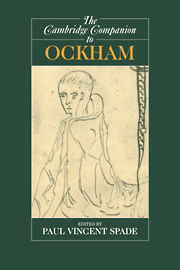Book contents
- Frontmatter
- Introduction
- 1 The Academic and Intellectual Worlds of Ockham
- 2 Some Aspects of Ockham's Logic
- 3 Semantics and Mental Language
- 4 Is There Synonymy in Ockham's Mental Language?
- 5 Ockhams' Nominalist Metaphysics
- 6 Ockham's Semantics and Ontology of the Categories
- 7 Ockham's Philosophy of Nature
- 8 The Mechanisms of Cognition
- 9 Ockham's Misunderstood Theory of Intuitive and Abstractive Cognition
- 10 Ockham's Ethical Theory
- 11 Ockham on Will, Nature, and Morality
- 12 Natural Law and Moral Omnipotence
- 13 The Political Writings
- 14 Ockham on Faith and Reason
- 15 Ockham's Repudiation of Pelagianism
- Bibliography
- Citations
- Index
12 - Natural Law and Moral Omnipotence
Published online by Cambridge University Press: 28 May 2006
- Frontmatter
- Introduction
- 1 The Academic and Intellectual Worlds of Ockham
- 2 Some Aspects of Ockham's Logic
- 3 Semantics and Mental Language
- 4 Is There Synonymy in Ockham's Mental Language?
- 5 Ockhams' Nominalist Metaphysics
- 6 Ockham's Semantics and Ontology of the Categories
- 7 Ockham's Philosophy of Nature
- 8 The Mechanisms of Cognition
- 9 Ockham's Misunderstood Theory of Intuitive and Abstractive Cognition
- 10 Ockham's Ethical Theory
- 11 Ockham on Will, Nature, and Morality
- 12 Natural Law and Moral Omnipotence
- 13 The Political Writings
- 14 Ockham on Faith and Reason
- 15 Ockham's Repudiation of Pelagianism
- Bibliography
- Citations
- Index
Summary
What follows is as much reconstruction provoked by Ockham as a study of Ockham. My main aim is to provide a framework to accommodate various things Ockham said but did not put together as neatly as we might wish.
What provokes this project is the apparent tension between obedience to divine will, which figures so prominently in Ockham's academic writings, and the nonsacral reasonableness so prominent in his political works. Granted, both divine command ethics and a demonstrative science of morals are found in the academic writings, and extensive references to God's will as well as astute Aristotelian political analysis are found in the political works. Ockham did not abandon God's will in favor of philosophical reason when he abandoned John XXII for the protection of Ludwig of Bavaria. Yet there is, I believe, something to the impression that Ockham, especially the earlier Ockham, held God's will to be a uniquely supreme, comprehensive, unrestricted moral principle, and also something to the impression that the later, political Ockham was distinctive in arguing for a secular political order operating according to a rationally ascertainable natural law but lacking any inherent religious orientation. At any rate, such impressions set the problem I want to grapple with in this chapter.
- Type
- Chapter
- Information
- The Cambridge Companion to Ockham , pp. 273 - 301Publisher: Cambridge University PressPrint publication year: 1999
- 13
- Cited by

